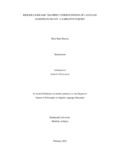
Please use this identifier to cite or link to this item:
https://hdl.handle.net/20.500.14301/299| Title: | ENGLISH LANGUAGE TEACHERS’ UNDERSTANDINGS OF LANGUAGE LEARNING ECOLOGY: A NARRATIVE INQUIRY |
| Authors: | Sharma, Mani Ram |
| Citation: | Sharma,M.R.(2023).English language teachers’ understandings of language learning ecology: A narrative inquiry. eachers’ Understandings of Language Learning Ecology: A Narrative Inquiry. |
| Issue Date: | Feb-2023 |
| School: | SOED |
| Department: | DOLE |
| Level: | M.Phil. |
| Program: | Master of Philosophy (MPhil) in English Language Education |
| Abstract: | Language learning ecology is a new concept encompassing various factors influencing language learning, including the social and cultural context, individual learning strategies, and available resources and technologies. This study focuses on the language learning environment and aims to explore the understanding of three secondary-level English language teachers on this topic. The methodology used in this study is narrative inquiry, which involved interviewing the teachers to gain a deeper understanding of their experiences with language learning ecology. The study revealed several challenges that impact language learning ecology, including motivation and engagement among learners, the lack of individualized learning experiences, and the limited availability of technology and resources. One of the significant challenges identified was the lack of motivation and engagement among learners, which hinders their ability to learn a new language effectively. This study suggests that goal setting, feedback, and collaborative learning can help address this issue. Another challenge is the limited availability of individualized learning experiences. The study suggests that language teachers can address this challenge by using differentiated instruction to meet the unique learning needs of each student. The availability of technology and resources was also identified as a significant challenge. The study suggests that language teachers can utilize available technologies and resources to create a more personalized and engaging learning environment for their students. In conclusion, this study provides valuable insights into the challenges of a language learning ecology. It highlights the need for language teachers to take a more comprehensive approach to language learning that addresses the individual needs of learners, the cultural and social context, and the availability of resources and technologies. By adopting a language learning ecology approach, language teachers can better support the development of multilingual and multicultural competencies among their students while improving their overall learning outcomes. |
| URI: | https://hdl.handle.net/20.500.14301/299 |
| Appears in Collections: | Dissertation |
Files in This Item:
| File | Description | Size | Format | |
|---|---|---|---|---|
| WCC 16 May Maniram_Mphil.pdf | 558.94 kB | Adobe PDF |  View/Open |
Items in DSpace are protected by copyright, with all rights reserved, unless otherwise indicated.